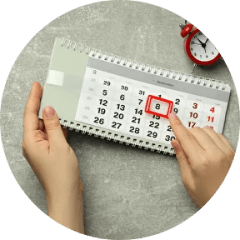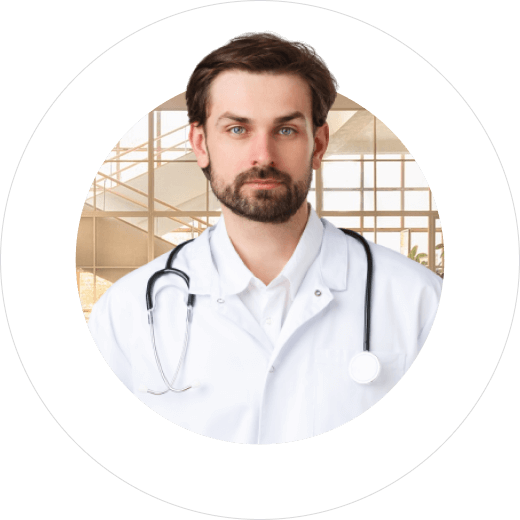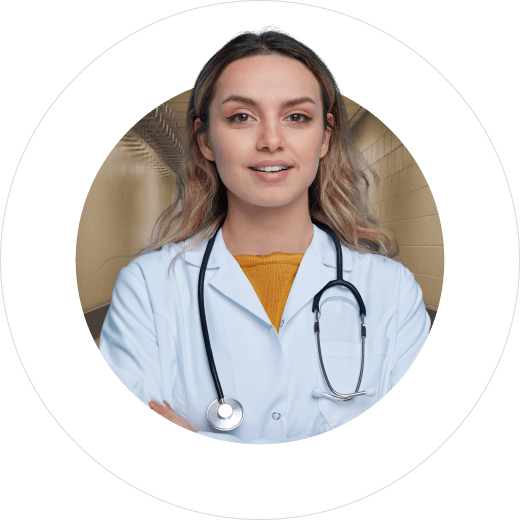Get Depression Treatment Online in 24 Hours
Get online help for depression and see how bright your life can be.
You might be going through difficult times, but they don’t have to last forever.
Let MEDvidi doctors help you find the way to remission.

Check Your Depression Symptoms Online
The Beck Depression Inventory (BDI) is a commonly used assessment developed by Aaron T. Beck. The psychometric questionnaire helps to determine if a person has depression and to what severity. It is a useful tool that allows monitoring of the patient’s mental health.
The multiple-choice test includes 21 statements. Please read each of them carefully and choose the answers that best describe your state. When answering, only include the period of the past two weeks, including today.
How we work
Take three simple steps to feel better!

1. Sign Up
Create an account, provide basic health information, and choose a convenient date and time for your appointment.
2. See A Doctor
Consult with a healthcare provider who can diagnose depression online. If medically determined you may be prescribed a prescription for antidepressants after the first visit.


3. Attend Follow-ups
Regular appointments help you monitor your progress and enable the provider to e-prescribe new prescriptions in a timely fashion.
We choose experienced clinicians and use evidence-based techniques to provide effective depression treatment.
Why Choose MEDvidi?
Medical experts licensed to work in your state and available online
Comprehensive treatment plans
Evidence-based treatment for depression tailored to your symptoms and needs
Online appointments within 24 hours
Follow-ups and mental health support during the whole treatment process
Online and timely medication management
We monitor the latest advances in depression treatment to offer effective strategies and to help you on your journey to achieve the desired relief.
Get Help for Depression Online
- An online 30-minute visit
- Symptoms check
- Identifying treatment goals
- Developing a treatment plan
- Prescribing medications if necessary
$195
- Regular 15-minute visits
- Symptoms monitoring
- Prescription refills
- Treatment adjustments
- Working on thinking and behavioral changes
$159
We Know How to Effectively Treat:
Major depressive disorder (MDD) is described as a persistently low mood that influences one’s day-to-day life. Its common symptoms are loss of pleasure in activities, apathy, anxiety, changes in appetite, sleep problems, ruminations, etc. Major depressive disorder treatments include talk therapy sessions, medications, or their combination.
SAD occurs during a specific time of the year. Lack of sunlight and other climatic factors may cause hopelessness, irritability, sleepiness, social isolation, and fatigue. Apart from standard medications and talk therapy, light therapy may be prescribed.
This condition is also called dysthymia; it is a long-term mild depression. Treatment options involve medications and psychotherapy aiming to manage the symptoms like hopelessness, guilt, fatigue, low energy, irritability, and sleep changes.
New mothers have a risk of experiencing postpartum depression. It might develop after childbirth and grow into a major depressive disorder if left untreated. Key symptoms include fatigue, fears, restlessness, difficulty bonding with the baby, irritability, and repetitive irrational thoughts.
The treatment plans vary slightly in the case of mild, moderate, and severe depression. The difference may be in the number of counseling sessions, the choice of suitable depression meds, and the necessity to combine these approaches.
At MEDvidi, you can get help for depression online: manage your prescriptions for suitable medications from home and receive personalized support during video consultations. Numerous studies have shown that online treatment is effective and complements offline services.
SmartCare symptom checker:
- An evidence-based online depression screening tool
- Contains science-backed clinically tested questions
- Conducts an accurate evaluation of symptoms
- Shows the results immediately after the completion
SmartCare checks common medical symptoms of depression, and is often used in conjunction with a doctor consultation.
Only a certified mental health professional can rule out other disorders, make a clinical diagnosis, and tell you more about treatment options suitable for your situation.

Depression Symptoms
The signs may vary from mild to severe depression symptoms in different people, mainly including the following:
- Hopelessness and sadness
- Apathy and anhedonia
- Low energy levels and low motivation
- An irrational feeling of worthlessness
- Anxiety and difficulty concentrating
- Memory problems and slowed thinking
- Anger and irritability
- Unexplained aches and pains
- Weight gain or loss of appetite
- A lack of sleep or oversleeping
- Suicidal thoughts in extreme cases
Try online depression counseling to know how to manage your symptoms properly.
Early diagnosis and proper depression treatment can alleviate symptoms allowing care to be directed at achieving remissive episodes and relapse prevention. If left untreated, this disorder may result in challenges at work and in relationships, physical illnesses, risky behavior, and addictions.
Depression detection requires a comprehensive psychological or psychiatric evaluation conducted by a certified professional. During such screening, the patient’s symptoms, their duration, and mix are analyzed and compared to the criteria mentioned in the DSM-5 (Diagnostic and Statistical Manual of Mental Disorders, Fifth Edition). You may also be asked to go through a physical exam and lab tests to rule out other conditions. When it comes to treatment, the combination of psychotherapy and medications has proven to be the optimal treatment for clinical depression.
Types of Therapy for Depression
Cognitive-Behavioral Therapy (CBT)
CBT has proven to be effective for major depressive disorder, and in some cases, it is as effective as medications. Cognitive-behavioral therapy focuses on helping the patient to restructure irrational beliefs and ruminations and to address negative thinking. Focusing on thoughts and emotional responses also allows the patients to enhance healthy behavior patterns.
Dialectical Behavioral Therapy (DBT)
DBT is a typical element of the holistic approach to depression treatment. It emphasizes the patient’s ability to identify, analyze, accept, and manage their emotions. It involves many techniques similar to those in CBT and is characterized by four major aspects: regulating emotions, raising distress tolerance, improving interpersonal effectiveness, and practicing mindfulness.
Interpersonal Therapy (IPT)
IPT is a common therapy for depression and is often used to manage mild and moderate symptoms. This type of counseling usually has a time limit of about 20 sessions. The main approaches of interpersonal therapy include analyzing the patient’s significant relationships and how they affect their mental state and learning skills to improve those relationships.
Problem-Solving Therapy (PST)
The main goal of problem-solving therapy is to assist the patient in learning how to manage stressors effectively. It focuses on mastering adaptive problem-solving and healthy coping techniques. PST also includes working on emotional regulation, especially emotions caused by challenging situations and events.
Connect with a doctor online to know which type of therapy will suit you best.
Medical Treatment for Depression
Patients with major depressive disorder who are experiencing moderate to severe
symptoms may be recommended to try a pharmacologic treatment for depression.
There are different types of antidepressants, and the doctors choose the most suitable
option according to the symptoms and health history.
Antidepressant Medications
Antidepressant medications are prescription medications used to treat depression and other related mental health conditions. They work by targeting imbalances in certain brain chemicals called neurotransmitters, particularly serotonin, norepinephrine, and dopamine. These medications can help improve mood, reduce depressive symptoms, and restore a person’s overall sense of well-being.
Types of Antidepressants Available Online
- Remeron (mirtazapine)
- Wellbutrin SR & XL (bupropion)
- Trintellix (vortioxetine)
- Trazodone
- Nefazodone
- Pamelor (nortriptyline)
- Norpramin (desipramine)
- Protriptyline
How Antidepressant Medications Work
Patients with major depressive disorder who are experiencing moderate to severe
symptoms may be recommended to try a pharmacologic treatment for depression.
There are different types of antidepressants, and the doctors choose the most suitable
option according to the symptoms and health history.
Types of Antidepressants Available Online
Selective serotonin reuptake inhibitors (SSRIs) work by blocking the reabsorption (reuptake) of serotonin in the brain. This leads to increased levels of serotonin, a neurotransmitter associated with mood regulation.
Serotonin-norepinephrine reuptake inhibitors (SNRIs) target the reuptake of both serotonin and norepinephrine. It increases the levels of these neurotransmitters, which can help improve mood and alleviate depressive symptoms.
Atypical antidepressants target the modulation of neurochemicals like noradrenaline, serotonin, or dopamine in the brain via different mechanisms. An increase in neurotransmitter levels corresponds to improved mood and functioning.
Monoamine oxidase inhibitors (MAOIs) work by inhibiting the action of an enzyme called monoamine oxidase. This enzyme breaks down neurotransmitters like serotonin, norepinephrine, and dopamine.
Tricyclic antidepressants (TCAs) affect the reuptake of serotonin and norepinephrine. However, they are less commonly prescribed due to their potential side effects and overdose risks.
How to Get Antidepressants Prescribed Online
Obtaining a prescription for antidepressants requires several steps:
- See a licensed healthcare provider who can evaluate your mental health state and make a diagnosis.
- Discuss your symptoms and their impact on your daily life.
- Discuss the available treatment options and ask about potential benefits and side effects.
- Get a prescription and detailed intake instructions.
Remember to schedule regular follow-up appointments to monitor your response to medication and refill your antidepressant prescription on time.

Personal Portal: Everything you need in one place
- Easy scheduling: Schedule a visit from your couch, any time, no waiting in line!
- Comprehensive visit management: Reschedule your appointment in a few clicks.
- Plan in advance: No forgetting to schedule that follow-up next month!
- Track your prescription online: Check your prescription status anytime and know when the medication is ready to pick up.
- Switch pharmacies: Your chosen pharmacy doesn't have your medication? Select another one in a minute.
- Save personal details: No need to repeatedly fill out personal and medical information. Just choose a date and time to book a visit.

Advantages of Online Prescriptions
No long lines and waiting hours. Everything is done from the comfort of your home.

- Fewer errors in medications names and dosages
- Easily accessible prescription history
- Wider availability of services
- Shorter wait times
- No need to visit a clinic every month
- Smooth workflow, as new online prescriptions may be delivered directly to pharmacies.
| MEDvidi Mental Telehealth | Traditional Clinics | |
|---|---|---|
| Cost of an initial visit | $195 | $400-500 |
| Having appointments within 24 hours | ||
| Booking or rescheduling visits in a minute | ||
| Scheduling multiple visits in advance | ||
| Saving time on travel | ||
| Video appointments from home or any location | ||
| Online prescriptions sent to your pharmacy | ||
| Online prescription refills and treatment adjustments | ||
| Fast and caring responses from the Care Team | ||
| Over 60+ medical providers experienced in mental health treatment |
Useful Materials
Knowing the warning symptoms and mastering supportive self-help techniques is beneficial. Use trusted resources to learn more about depression and discuss it with your doctor during your online visit.
Depression Can Be Treated
Personalized holistic depression treatment is just one step away.
You may feel hopeless now, but your depression can be treated with proper professional help.
FAQ
The treatment of depression often requires a comprehensive approach tailored to each individual’s needs. It may involve a combination of strategies, including professional mental health support, medication treatment, lifestyle changes, etc.
To legally order antidepressants, it is necessary to follow proper channels and procedures. The process starts by consulting with a healthcare professional. If a doctor determines that antidepressant medication is suitable, they will prescribe the recommended medication. In the case of virtual treatment, the doctor can send a prescription to a local pharmacy digitally.
Yes, telehealth doctors can prescribe antidepressants. Modern mental health treatment services involve online consultations via video calls with licensed healthcare providers.
These are prescription drugs, and they should only be used under the supervision and guidance of a qualified healthcare professional.
There are currently no over-the-counter medications specifically approved for depression.